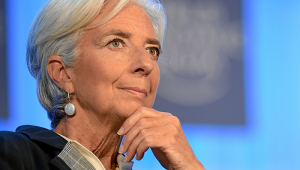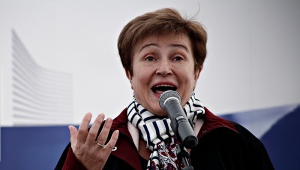Managing director Christine Lagarde said that the increased trade tension between the US and its allies could change the way trade is conducted and damage business confidence.
“The clouds on the horizon that we signalled about six months ago are getting darker by the day,” she said at a news conference in Berlin on Monday.
This came after a meeting of G7 countries at the weekend, when Donald Trump backed out of a joint statement agreed by the allies, which called for the need for “free, fair and mutually beneficial trade” and stressed the importance of fighting protectionism.
Trump said on Twitter after leaving the meetings: “Fair trade is now to be called fool trade if it is not reciprocal.”
In response, Lagarde said: “The biggest and darkest cloud that we see is the deterioration in confidence that is prompted by [an] attempt to challenge the way in which trade has been conducted, in which relationships have been handled and in which multilateral organisations have been operating.”
Other G7 countries, including France, Canada, UK, Italy, Germany and Japan, lobbied unsuccessfully at the summit for the US to reverse its new tariffs on steel and aluminium imports.
But Trump challenged the world leaders to eliminate all trade barriers, tariffs and subsidies and threatened to stop trading with them entirely.
Germany and France criticised Trump for pulling his support.
The IMF continues to predict that the global economy will grow 3.9% this year and next, the fastest pace since 2011. But, beyond that, it believes that growth will weaken.
Lagarde spoke after a meeting with German chancellor Angela Merkel and the chiefs of the World Trade Organisation, the World Bank, the Organisation for Economic Cooperation and Development (OECD), the International Labour Organization and the African Development Bank.
WTO director-general Roberto Azevêdo told the news conference in Berlin: “We must … stop this escalation of tensions. A tit-for-tat process is not going to be helpful.”
He added: “The US has been focusing much more on bilateral – unilateral even sometimes – measures, which is not something that is supportive of the rules-based trading system.
“They have been complaining about the system, they say that they want to improve the system, but we would expect a more constructive approach on their part.”
At the OECD last month, US commerce secretary Wilbur Ross told a panel that multilateral agreements currently take too long, are too complex and often entail compromises that are not in anyone’s best interest.
“Too often, multilateral [agreements] become an excuse for people to say they are fixing the problems in the system, but what they are doing is rescheduling a meeting three months down the road,” Ross said.







